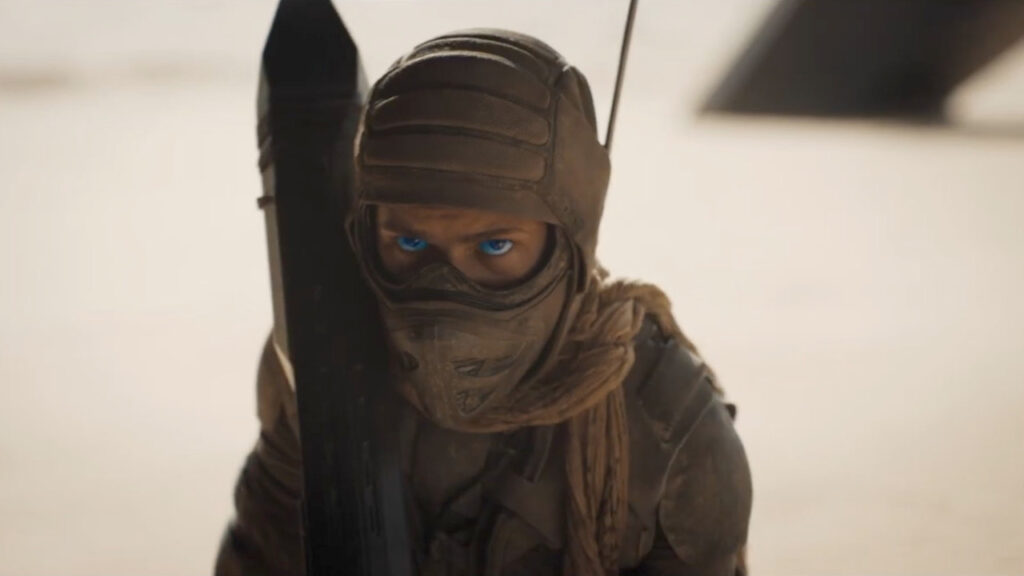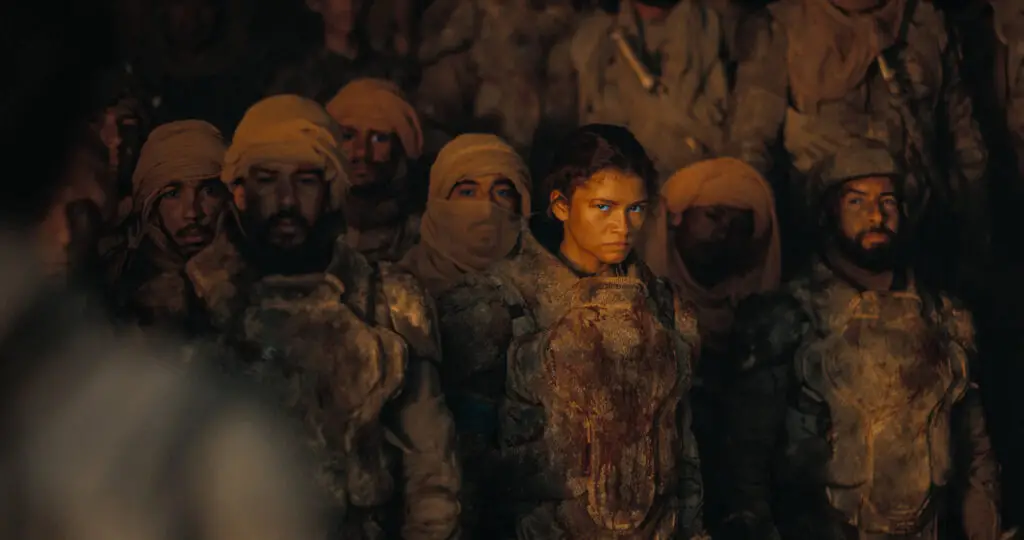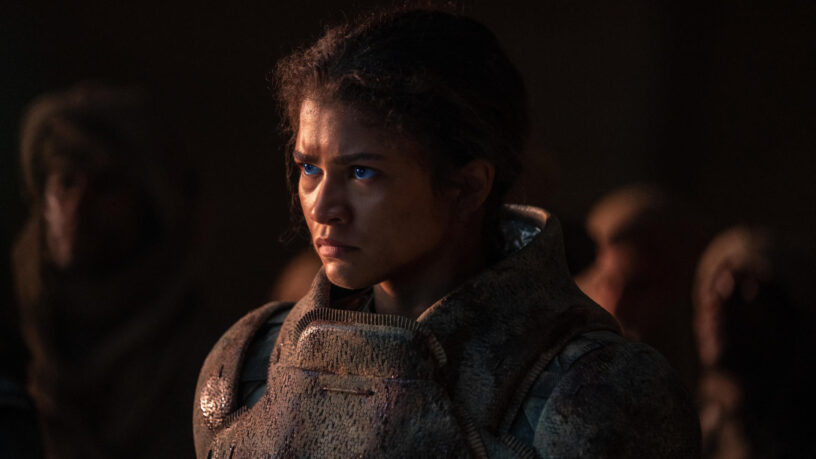This article continues my analysis of the women in the Dune: Part Two movie, begun in “Dune: Part Two’s Treatment of Women is an Abomination.”
Teenagers destined to devote themselves to one another in a loving relationship, in the face of adversity and cross-cultural tension, is out. Modern-day cynicism driving a wedge between them, so each can be independent individuals, is in.
The young Fremen woman Chani in the Dune: Part Two film has shed her religious role and beliefs from Frank Herbert’s 1965 novel and instead taken on a skeptical, doubting stance toward Paul, that we’re supposed to view as complex and empowering. The result is a fractured love story, lack of mutual partnership, and dismissal of religious and cultural authority: a Chani who is a fighter but otherwise untethered from her community.
In an interview, director Denis Villeneuve said he wanted to focus on the women and explained some of the reason for the change to Chani’s character:
In the book, Chani is a believer. In this adaptation, Chani is part of a group of Fremen that don’t believe in this idea of a messianic figure. I did that for the audience to feel that the Fremen are in a society that is more complex, that everybody does not believe in the Bene Gesserit idea. This contrast gave me the possibility to have some perspective on Paul at the end.
Denis Villeneuve Explains Why Women Are ‘the Epicenter’ of His Dune Universe
In another interview, co-writer Jon Spaihts indicated that he and Villeneuve wanted to expand female roles, including that of Chani:
We also felt there was room to look for [even] more female participation, because there are ways in which Dune was very progressive for its time — but its time was the ‘60s.
‘Dune’ team on splitting up the book, expanding the female roles and ‘Part Two’ planning
There’s a perception that Chani is a beleaguered concubine and mindless follower of Paul in Dune, whose character required updating to empower her in the eyes of modern audiences. Below I draw from my previous scholarship on Chani in Dune and discussion of her in my book Adaptations of Dune in order to analyze her character in Herbert’s novel and compare it to her portrayal in the films Dune: Part One and Dune: Part Two.
Chani as a Mysterious Figure Introducing Paul to a Desert Land
In the early part of the book, Chani makes her first appearance as someone Paul has dreamed about. Latter tells Reverend Mother Mohiam he has had multiple dreams about a very skinny girl in a cavern who has big eyes, all blue, and who asks him to tell her about the waters of his homeworld. This piques our curiosity about this girl and where Paul is headed to, a place where people don’t understand terms such as beach, surf, and seagulls.

As discussed in my book Adaptations of Dune, Chani opens Dune: Part One with a voice-over describing the beauty of the desert and her concern about what will happen after the departure of the oppressive Harkonnen rulers. This change from the book visually introduces the Fremen much earlier and shows her as one of the Fremen engaged in physical confrontations with their enemy. But in her brief appearances in the rest of the film, she usually appears as a kind of exoticized dream girl in Paul’s visions. Instead of her stillsuit, she wears long, sheer, flowing robes blowing in the wind and sandals. Some have compared her to the “Afghan Girl” shown on the cover of National Geographic magazine in 1985. In one scene, she is shown leaning in toward Paul for a kiss. The film offers a much more romanticized and exoticized vision of a silent Chani when compared to the book.
Chani as a Fierce Young Fighter
In the book, Chani is a fierce young fighter before and after meeting Paul. Jessica and Paul encounter the flesh-and-blood Chani when they stumble upon the Fremen in the desert after their flight from the Harkonnen, and Jessica is intrigued that the Fremen “travel as a military company—even the girl, Chani.” Paul sees her as “a small figure in Fremen robes, a shadowed face peering out at him from the hood, and the muzzle of one of the projectile weapons aimed at him from a fold of robe. ‘I am Chani, daughter of Liet.’ The voice was lilting, half filled with laughter. ‘I would not have permitted you to harm my companions,’ she said.”
Far from being a stereotypical feminine figure, Chani matches the description of the Fremen given by Dr. Yueh to Paul from earlier in the story: “Their women are as fierce as the men. Even Fremen children are violent and dangerous.” In a hostile, desert environment with oppressive overlords, the Fremen seem to have had little choice but to cultivate battle-ready men and women and children. While still young, Chani is prepared for violence and haughtily looks down on Paul as an untrained off-worlder.
Even after Chani becomes Paul’s lover, she still acts according to her own will, to his protest at times. An argument between them shows that Chani retains her independent nature and fierce fighting skills:
‘I dispatched one who came to challenge you in single combat, Usul.’
‘You killed him?’
‘Yes. But perhaps I should’ve left him for Harah.’
… ‘But he came to challenge me!’
… ‘I am no longer a child hunting scorpions in the sietch by the light of a handglobe, Usul. I do not play games.’
Paul glared at her, caught by the odd ferocity beneath her casual attitude.
‘He was not worthy, Usul,’ Chani said. ‘I’d not disturb your meditations with the likes of him.’
Over Paul’s protests, Chani defends her decision to slay the challenger without consulting Paul. She also suggests that another Fremen woman, Harah (formerly Jamis’ spouse), could also have easily handled this challenger. Chani clearly considers herself a capable fighter and one who knows what is best for him, despite his prideful belief that only he should combat his challengers.

The films also portray Chani as a fierce young fighter and more explicitly show her killing enemies. In addition to the brief scene of her in a battle against the Harkonnen in Dune: Part One, there are multiple scenes of her engaged in combat in Dune: Part Two. One time she uses a rocket launcher against ornithopters, and other times she slaughters enemies with a knife in close combat. She seems like one of the soldiers, aside from having a special connection with Paul.
Chani as a Guiding Figure
Chani in the book takes on a role as a guiding figure for Paul once he and his mother seek sanctuary among her people. As the daughter of Liet-Kynes and a Fremen woman, Chani has parentage from two worlds—the scientific world of the Imperium and the off-the-grid world of the Fremen. She is also the niece of Stilgar, giving her additional prestige and linking her with a strong and wise Fremen leader. Like her father, Chani becomes a go-between guide for Paul as she initiates him into her world. At first she is somewhat disdainful. When Stilgar entrusts Paul to her care—telling her to “take the child-man under your wing. Keep him out of trouble”—she immediately assumes a dominant stance, saying, “Come along, child-man” as if Paul were helpless.
Her attitude doesn’t stop her from doing her duty and assisting Paul, though. She helps Paul in his fight with Jamis by giving him a crysknife and a warning as to Jamis’ fighting style, then blesses Jamis’ water gifted to Paul after his victory in the fight. Paul then asks her to hold the watercounter rings for him until he learns the proper way to do it, not realizing it is a Fremen courtship ritual symbolizing a commitment. This foreshadows their future romantic relationship.
In the films, Chani is also a guide to Paul, though she seems a little more begrudging about it. In Dune: Part One, she is less helpful when they first meet and seems overly dismissive—she calls him a “little boy” and indicates that she thinks he will probably die in his fight with Jamis. She gives him a crysknife from her great-aunt so he can die with honor, but doesn’t warn him about Jamis’ fighting style. Instead, she says, “Jamis is a good fighter. He won’t let you suffer.” Stilgar does tell her to watch over the newcomers, and she closes the film by telling Paul, “This is only the beginning.”
The second film shows Chani to be more open to helping Paul, but takes pains to emphasize that he has a lot to learn. Paul keeps deferring to Chani as if he isn’t worthy to be among the Fremen. There is a scene of him trying to ‘mansplain’ to her how to do the sandwalk properly and quickly catching his error, and a scene where he says he’d like to one day be equal to her. Here he is, trained from birth to not only be a duke’s son and fighter (and a Mentat in the book), but potentially a male Bene Gesserit and a prescient being as well. He can certainly be humble about what it means to become Fremen, but he has been bred to be an extraordinary being and has no equal in the Imperium. The film heightens his dependence on her and de-emphasizes his reliance on prescience to integrate among the Fremen.
Chani as a Religious Leader
In the book, even at her young age, Chani takes on a position of religious authority among her tribe and maintains this throughout the story. Before Jessica becomes a Reverend Mother, Chani is consecrated as a Sayyadina in case Jessica fails to change the Water of Life. The Sayyadina are religious women who hold authority and preside over certain tribal rituals but have not taken the Water of Life. Reverend Mother Ramallo initiates Chani, saying, “I give her the silver skies, the golden desert and its shining rocks, the green fields that will be. I give these to Sayyadina Chani. And lest she forget that she’s servant of us all, to her fall the menial tasks in this Ceremony of the Seed.”
As a Sayyadina, Chani guides Jessica through the dangerous ceremony and retains a religious position herself even after Jessica succeeds. Stilgar demonstrates his awe for the religious Fremen women when he tells Jessica, “‘the Sayyadina, when they are not the formal leaders, hold a special place of honor. They teach. They maintain the strength of God here.’ He touched his breast.” The honor owed to the Reverend Mother also extends to the women under her, the Sayyadina.
Later, Chani shows her religious authority when she presides over another ritual, that of Paul’s sandworm-riding test. Despite the fact that she has since entered into a romantic relationship with him, she still “must be Sayyadina and observe the rite that it may be reported truly in the Chronicles.” As a religious figure, Chani has responsibility for observing history accurately and participating in the rituals that bind the tribe.
Far from being pushed into religious roles that traditionally might limit them, the women of Dune find in religion an avenue to assume agency and power that otherwise might not be available to them in a feudal society or a real-world religion. In fact, Jessica uses her authority as a Reverend Mother to prevent the Fremen from taking Paul’s water (i.e., killing him) when he goes into a coma after secretly drinking the Water of Life, and Chani uses her smarts to guess what Paul has done and successfully awaken him. She quite literally resurrects him from what was almost his death.

Dune: Part Two radically alters Chani’s attitude toward religion and turns her into a doubting figure, untethered from a sense of cultural identity. In the first film, Chani tells Paul after meeting him that she doesn’t believe he’s the Lisan al-Gaib, the Voice from the Outer World or messiah figure that is prophesied to come to help the Fremen. This immediately sets her up as a skeptic (like Jamis) in opposition to Paul.
The second film reveals Chani to actually be a skeptic of religious belief and practices in general. Far from taking on an honored position within the Fremen’s women-controlled religious hierarchy as she does in the book, Chani seems to hold contempt for her fellow Fremen who hold to a faith. The film invents a schism between so-called ‘northern Fremen’ and ‘southern Fremen,’ believers and non-believers, and places Chani firmly in the non-believer camp. She and her female friend look repulsed at the Water of Life ceremony that Jessica undergoes and don’t show any regard for the dying Reverend Mother Ramallo. Here is what is essentially a miraculous ritual where a woman takes on the memories of the Fremen ancestors before her by drinking a special spice-infused liquid, and there are Fremen shrugging at the whole thing like it’s a bunch of superstitious nonsense.
Instead of respecting Stilgar as a great warrior and leader, Chani looks down on him for his religious beliefs. The film leaves little room for the idea that the Fremen have a unified culture and faith that exist in addition to whichever beliefs the Bene Gesserit missionary implanted in the past. Although Chani is temporarily won over by Paul’s insistence that he doesn’t want to be the Fremen’s messiah, she eventually turns against Jessica and Paul for taking advantage of the Bene Gesserit-planted prophecy within the Fremen’s religious beliefs. She appears to be skeptical of the whole concept of religion.
Chani as a Predestined Lover
Chani and Paul are teenagers destined to be together in the book. As they bond over the shared loss of their fathers to the Harkonnen, Paul tells her that he feels like he knows her because he has had visions of them together. She says she is afraid because during the sharing of the spice drug among the Fremen she also had a vision: “I see a child … in my arms. It’s our child, yours and mine.… How can I know every feature of you?” While Paul struggles with a vision of the future and begins crying, she urges him to not mourn for those still living and comforts him:
She put a palm against his cheek, ‘I’m no longer afraid, Usul. Look at me. I see what you see when you hold me thus.’
‘What do you see?’ he demanded.
‘I see us giving love to each other in a time of quiet between storms. It’s what we were meant to do.’ …
‘You’re the strong one, Chani,’ he muttered. ‘Stay with me.’
‘Always,’ she said, and kissed his cheek.
And so Part II of the book closes, with the blossoming romance of these young people who are predestined to be together and feel close already due to their limited visions of their relationship. They are both frightened of the future and the violence it will bring, but choose to find comfort in each other in the time they have. Later Paul thinks of her as “Chani, his soul, Chani his Sihaya, sweet as the desert spring,” clearly in love. And in the closing of the novel, he assures her that even though he must marry Princess Irulan out of political necessity, he swears that the princess will not get his touch or desire or bear any of his children. Essentially, Chani will be his true wife in all but name.

In Dune: Part Two, Chani and Paul only share a few scenes of love and tenderness before being driven apart. There are some stereotypical love elements. For example, while Chani explains how windtraps work, Paul loses focus as he stares into her eyes. They kiss on the sand dunes and appear to be sharing a tent. Then, the only thing that can wake Paul from his coma after drinking the Water of Life is a tear from Chani mixed with the Water, a kind of Sleeping-Beauty concept created for the film. Upon waking, though, she slaps him and storms off, ruining any potential for bonding after his near-death experience. Chani’s refusal to accept the path of religious leadership he is on or accept the need for him to arrange a political marriage with the Emperor’s daughter drives a wedge between them and prevents their young romance from flourishing.
Chani as a Young Mother
In the book, Chani’s vision of having a child with Paul does come to pass and she bears a son named Leto II. Chani and her baby spend some time in safety in a new sietch in the south with Jessica and Alia, Paul’s baby sister. Paul believes that Jessica hasn’t liked the fact that he and Chani essentially took on this “marriage of youth,” but he feels reassured when Jessica tells him, “I do love your Chani. I accept her.” Jessica and Chani even have a bonding moment over their roles as mothers when Jessica reaches out to Chani for help when Paul is in the coma:
Chani suppressed the desire to dash forward, throw herself across him. She found her thoughts, instead, going to her son—Leto. And she realized in this instant that Jessica once had faced such a moment—her man threatened by death, forced in her own mind to consider what might be done to save a young son. The realization formed a sudden bond with the older woman so that Chani reached out and clasped Jessica’s hand. The answering grip was painful in its intensity.
Neither woman usually lets her guard down, but these two mothers let themselves be vulnerable in each other’s presence as they try to discover what has happened to their beloved Paul. Baby Leto II’s death in a raid on Sietch Tabr is one of the rare other times Chani expresses emotion openly as she sheds tears for her dead child.
The film removes Chani’s role as a young mother, though the scarf she ties on alludes to the scarf she wears in the book, which in the Fremen culture is a sign of a married or concubine woman who has birthed a son. The film focuses on Alia as a fetus in Jessica’s womb and doesn’t mention any child born of Chani.
Chani as a Wise Advisor
In the book, Chani’s ability to remain calm in the face of Paul’s coma convinces Jessica that Chani is actually similar to her: “She is brave, lovely and, ah-h-h, so perceptive, Jessica thought. She’d have made a fine Bene Gesserit.” This represents a compliment on the part of Jessica, a sign that she has indeed come around to accepting Chani as her son’s concubine and her grandchild’s mother. Paul also recognizes Chani’s intelligence and ability to act as a wise advisor to him just as his mother does.
At the close of the story, Paul dismisses Reverend Mother Mohiam’s power over him, but he does not exclude women from his government. Instead, he asks his mother to negotiate the marriage alliance and include Chani by her side, because Chani “has wisdom and sharp eyes. And it is wisely said that no one bargains tougher than a Fremen.” Paul clearly trusts the two most influential women in his life with the political responsibility of negotiating a contract between himself and the Emperor.
Since Dune: Part Two sets up Chani in opposition to Paul, she is unable to take on the role of advising him and essentially dismisses herself from his government in the final scene. Even in an earlier scene in the circle of leaders among her own people she is pushed to sit down and be quiet, by the outsider Gurney Halleck no less. As one who criticizes Paul and where he is leading the Fremen, Chani is not listened to and is on her own at the close of the film.
Concluding Thoughts
As the above evidence shows, in Herbert’s novel Dune, Chani has a range of roles and avenues of strength, influence, and power. She becomes Paul’s love but begins as the young woman who introduces him to a foreign desert land in his visions and the one who guides him as he integrates into the Fremen community. She is a fierce young fighter as well as a religious leader in her role as Sayyadina, standing apart from Paul to oversee the cultural rites. She is a young mother who finally wins the approval of her child’s Bene Gesserit grandmother, Jessica, and saves Paul from a long coma. She is wise enough to understand the political necessities of Paul legally marrying a princess and trusted by him to negotiate the marriage contract.
Chani’s attachment to Paul is an important part of the story, but it does not reduce her to being a simple, one-dimensional female character. Chani is an essential window into Fremen culture. Her multi-faceted character challenges stereotypes about women of faith and women in non-Western cultures that continue to be debated about in the real world.
Meanwhile, the films—Dune: Part One and especially Dune: Part Two—make substantial changes to Chani’s character in the name of making her more independent, which end up making her more stereotypically masculine. She is mainly a fighter who has a fling with Paul. She is not a mother and not a religious figure, instead rejecting any association with religious beliefs or practices. She is almost a second Jamis except that she has a brief romantic entanglement with Paul.
Chani’s disavowal of the religious elements in her culture arguably represents a contemporary, Western, cynical view taking over the story; that religion must be purged to empower the individual, to free women from their shackles. This change in Chani’s character appears to be intended to make her more free and complex, because she’s not a follower and she doesn’t believe. She can be dismissive of Paul and sees little to learn from him. Their relationship is then not a mutual exchange, a partnership, but something she has to turn aside from to be independent.
The underlying message is that if Chani were a woman of faith like in the book, she couldn’t be an interesting, complex character, just a follower who’s oppressed. The takeaway is that the Fremen’s religious system is bad because it was influenced by outsiders. That faith makes people weak and that being a fighter and killer is preferable to being like the women who live in the sietches, wear headscarves, and discuss religious ideas, or who carry the tribe’s ancestors in their bodies.
Chani may also reflect a deeper fear in the increasingly secular West about the power of religion in the 21st century. It is possible that the idea in Dune of an oppressed group militarily united under a religious banner, drawing strength from a belief in something greater than themselves, is still too much to put on screen in an adaptation, especially given the book’s Middle Eastern influences. If viewers need to be reassured that not everyone believes, that there is division, that someone is the rational one to turn away from the ‘fundamentalists,’ then Chani offers this. She is the contrasting perspective, the voice of so-called reason, who questions the religious indoctrination.
But ultimately, the considerable changes made to Chani’s character for Denis Villeneuve’s film adaptations alienate her from her lover and her culture and strip her of the many roles she has in the book. Any complexity gained by her skepticism is offset by the loss of her influence and authority and her place in her community. Chani’s depiction in the films worryingly suggests that the price of being an independent woman means being faithless and alone.


